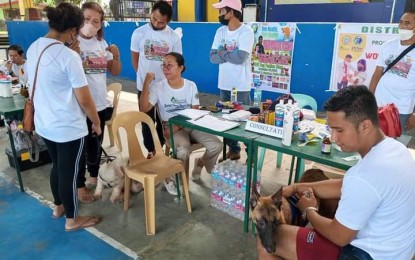
CONSULTATION FOR PETS. Dog owners in E.B. Magalona town in Negros Occidental bring their pets for consultation and vaccination during the Provincial Veterinary Office Third District Field Unit’s observance of World Rabies Day on Sept. 28. 2022. As of Oct. 4, data from the Provincial Health Office showed that 10 persons have already died due to suspected and confirmed rabies infections this year. (Photo courtesy of Provincial Veterinary Office-Negros Occidental)
BACOLOD CITY – The Negros Occidental provincial government has intensified its anti-rabies campaign to address the increasing number of animal bites and human deaths in the province this year.
Data from the Provincial Health Office (PHO) as of Tuesday showed that in the first half of the year, some 14,232 animal bite incidents have already been reported compared to last year’s total of 21,659 cases.
Also, 10 human deaths - nine suspected and one confirmed - have been recorded this year, from only four in 2021.
PHO rabies coordinator Rafael Marmolejo III said one of the reasons for the increase in rabies cases could be the low vaccination coverage rate among dogs in the past two years.
“In 2020 and 2021, based on the report of the Provincial Veterinary Office, the dog vaccination coverage was really low, below 70 percent,” he told reporters.
Marmolejo said since rabies infection is fatal, once the signs and symptoms appear, the patient could die.
He added that when bitten by an animal, the patient should apply first aid by washing the wound for 10 to 15 minutes with running water and apply povidone iodine only, and proceed to the nearest animal bite treatment center immediately.
Among the 10 fatalities, eight underwent “tandok”, a non-medical alternative supposed to treat wounds or remove rabies using an animal horn, instead of seeking immediate medical attention, Marmolejo said.
“Most of the cases were reported in the upland areas. One case refused to visit the animal bite center. Only when the signs and symptoms appeared, he decided to seek help, but it was too late,” he added.
In Negros Occidental, there are 21 animal bite treatment centers located in various hospitals, city health offices, and rural health units.
In the last week of September, 69 doctors and nurses in the province attended training and practicum on rabies and animal bite management conducted by the Department of Health in collaboration with the PHO Rabies Program to augment the depleting health workers in the treatment centers. (PNA)
